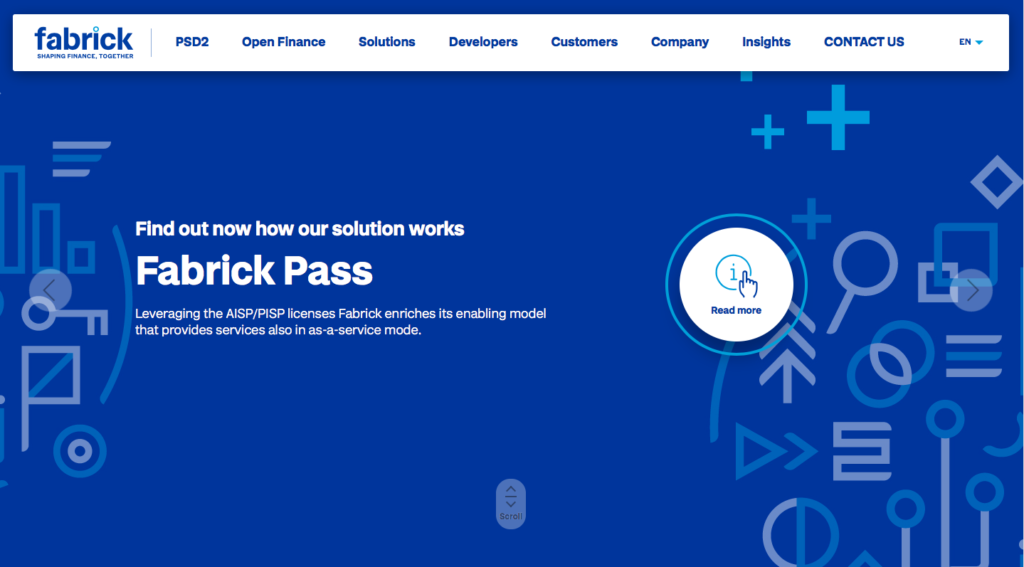
Last week, we leveraged the occasion of French alum Ledger’s new, cryptocurrency-focused, business division to bring readers up to speed on the latest in French fintech. This week, news from Fabrick, a financial services company based in Milan (and a sponsor of the just-concluded FinovateEurope Digital) offers us a similar opportunity to catch up with innovations in fintech in Italy.
Fabrick announced this week that it had forged a partnership with Microsoft Italia. The collaboration will enable the open banking financial services provider to leverage cloud computing and other new technologies to develop solutions that help accelerate digital transformation in financial services. As part of the alliance, Fabrick’s offering will become a part of the Microsoft Commercial Marketplace and enable the company to better market its technology to the enterprise sector. Fabrick’s personal financial management solution is already available on Microsoft’s marketplace.
“For us, the partnership with Microsoft represents an extraordinary opportunity to grow and strengthen our positioning in the market,” Fabrick CEO Paolo Zaccardi said. “We have found a valuable ally who, like us, has seen in technological evolution and Open Finance a new way to innovate the delivery of corporate services for the end user.”

Founded in 2017, Fabrick is an open banking ecosystem and a regulated TPP. Within digital payments, channel innovation, and open banking, Fabrick helps enrich the offerings of banks, processors, and fintechs. With customers including Bankart, HDI Assicurazioni, and illimity, Fabrick made fintech headlines earlier this year via collaborations with DizmeID Foundation for a hackathon based on innovations in digital identity, and with Banca Progetto and Faire to help the Italian challenger bank offer an instant lending service for small and medium-sized businesses.
“We are particularly enthusiastic about this collaboration because it testifies to the validity of the ecosystem proposed by Fabrick,” Zaccardi said when the partnership was announced last month. “On the one hand (we have) the capacity of our platform, through which the service will be implemented, and on the other the important synergies that arise within our community Fintech District, of which Faire is part and through which we have begun to collaborate with them.”
Like France, which we looked at last week, Italy has a fintech industry that is often overlooked in the broader conversation on European financial technology. To this end, this week’s Finovate Global Reports turns to the Fintech District and its The Italian Fintech Guide 2020 for a peek into “the most promising fintech companies operating in Italy.”
According to Fintech District, Italy had 345 fintech startups as of the end of 2019. It is a young industry – with most startups at an intermediate stage of growth and with less than one million in capital raised. Additionally, these fintech teams have members who are, on average, less than 32 years old. As with most regions, fintechs in Italy have increasingly been looking to enhance the digital capabilities of incumbent banks and insurance companies – as well as developing B2C solutions for Italian consumers. Open banking has helped accelerate this trend, and companies like Fabrick have been among those helping banks and third party solution providers connect and innovate together.
To learn more about fintech in Italy, check out IBS Intelligence’s 5 Italian FinTech companies transforming the financial sector from last fall. For a more inclusive look, consider Italian entrepreneur Claudio Bedino’s Top 100 FinTech leaders and influencers in Italy that appeared a year before IBS Intelligence’s roundup.
In recent years, our FinovateEurope conferences have featured a number of alums headquartered in Italy, as well. Ten of these companies, along with the year of their most recent Finovate appearance and their home city, are listed below.
- Data Reply (2021) – Milan
- Altilia (2020) – Consenza
- Lokky (2020) – Milan
- Opentech (2020) – Rome
- SimplaVivo (2018) – Bologna
- Vipera (2018) – Milan (acquired by Fabrick in 2018)
- modeFinance (2017) – Trieste
- myInveno (2016) – Reggio Emilia
- CRIF (2014) – Bologna
- Finantix (2013) – Venice (merged with InvestCloud in 2021)
Here is our look at fintech innovation around the world.
Sub-Saharan Africa
- Bankly, a Nigerian fintech that is digitizing the country’s informal “thrift collections” system, raised $2 million in seed funding.
- Pan African Fintech Accelerator announced the ten startups that have been selected for its inaugural acceleration and immersion program.
- Kenyan digital payments company Asilimia launched its real-time, digital ledger app, Leja, for micro, small, and medium-sized enterprises.
Central and Eastern Europe
- U.S.-based investment giant Vanguard applied for a banking license in Germany in a bid to expand its robo-advisory offering.
- Berlin-based MODIFI raised $60 million in new funding from Silicon Valley Bank Germany to grow its digital trade finance business. The company made its Finovate debut last year at FinovateEurope.
- Jeff App, loan brokerage platform the the underbanked, received a $1 million investment that will help the Latvia-based company continue its expansion in Vietnam, its first market.
Middle East and Northern Africa
- Banque Saudi Fransi went live this week with Finastra’s treasury management solution, Fusion Kondor.
- Crowdfund Insider looked at the growth of Islamic and Sharia-compliant fintech services both in the MENA region as well as around the world.
- IBIS Intelligence highlighted three UAE fintech startups “to watch out for” this year.
Central and Southern Asia
- Indian digital lending platform KreditBee raised $70 million in follow-on funding as it closed its Series C round.
- Sri Lanka-based Seylan Bank launched its QR code-based payment solution, SeylanPay.
- DotPe, an offline-to-online merchant platform based in Gurugram, India, secured $27.5 million in Series A funding.
Latin America and the Caribbean
- Latin American fintech giant Credicorp unveiled plans to add new functionality to its Chile-based digital wallet and prepaid solution, Tempo.
- Brazilian payments company Ebanx has launched operations in Costa Rica and will expand to other Central American and Caribbean countries including El Salvador, Panama, Guatemala, and the Dominican Republic by the first half of the year.
- Kona, an Uruguayan company that leverages AI to enhance the customer experience, has been acquired by Miami-based fintech Technisys to bolster its digital banking offering.
Asia-Pacific
- Gimo, a fintech startup that serves underbanked workers in Vietnam, received seed funding from ThinkZone Ventures, BK Fund, and others strategic investors.
- Jakarta, Indonesia-based insurtech, Qoala, acquired Thai insurech FairDee in bid to expand into the Thailand market.
- Malaysia Debt Ventures and Kenanga partnered to launch a new $73 million fund to back new fintechs and stimulate the VC industry in Malaysia.
Photo by Emily Geibel from Pexels
